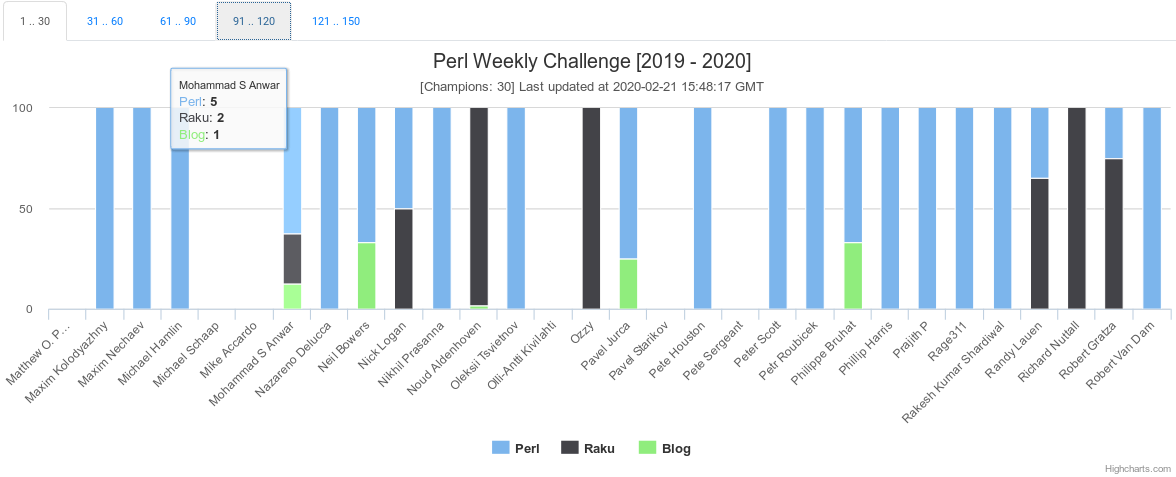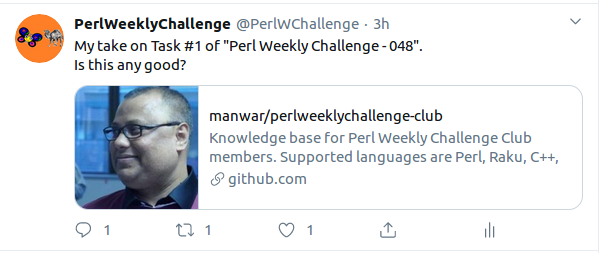Ever since I started the Perl Weekly challenge i.e. 25th March 2019, I have been planning to take part in the weekly challenge. Because of lack of time, I couldn’t take part in the past. In the Week #046, I finally took the plunge and contributed Perl solutions to the Perl Weekly Challenge - 046.
Challenge #046 (Task #1)
#!/usr/bin/perl
use strict;
use warnings;
my @messages = (
'P + 2 l ! a t o',
'1 e 8 0 R $ 4 u',
'5 - r ] + a > /',
'P x w l b 3 k \\',
'2 e 3 5 R 8 y u',
'< ! r ^ ( ) k 0'
);
my $table = [];
foreach my $message (@messages) {
my $column = 0;
foreach my $char (split /\s/, $message) {
$table->[$column++]->{$char}++;
}
}
map { print [ sort { $_->{$b} <=> $_->{$a} } keys %$_ ]->[0] } @$table;
Challenge #046 (Task #2)
#!/usr/bin/perl
use strict;
use warnings;
my @rooms = map { 1 } (0..500);
foreach my $employee (2 .. 500) {
my $room_number = $employee;
while ($room_number <= 500) {
$rooms[ $room_number ] = ($rooms [ $room_number ]) ? 0 : 1;
$room_number += $employee;
}
}
map { print "$_\n" if $rooms[$_] } (1..500);
Ryan Thompson, member of Team PWC, who reviews Perl and Raku solutions every week. This is what he said about my first contributions.
Mohammad, creator of the Perl Weekly Challenge, has finally entered the fray with a solution of his own! It may be a bit strange to welcome you to your own challenge, Mohammad, but I’m going to do it anyway. Welcome. :-)
Please checkout the reviews in detail.
I must admit, I was relieved to see my name in the contributors list. I am also now listed formally as member of “Team PWC” having contributed to the weekly challenge.

The following Week #047, I contributed just one solution in Perl for Task #2.
Challenge #047 (Task #2)
#!/usr/bin/perl
use strict;
use warnings;
my $start = 99;
my $count = 0;
while ($count <= 20) {
$start++;
my ($d1, $d2, $d3) = split //, $start;
my $divisor = sprintf("%d%d", $d1, $d3);
if ($start % $divisor != 0) {
next;
}
else {
$count++;
print sprintf("%d / %d\n", $start, $divisor);
}
}
If you noticed, so far my contributions are only in Perl. Doing Perl challanges was not a big deal, finding time to do the challange was a big deal, which I happen to succeed.
What next?
The title of my blog is “My first date with Raku” and I haven’t talked about it yet. Well, here comes the climax. This Week #048, I had little extra time to do the weekly challenge. I did it in Perl first for obvious reason.
Challenge #048 (Task #1)
#!/usr/bin/perl
use strict;
use warnings;
my @people = (1 ..50);
while (scalar(@people) > 1) {
my $sword = shift @people;
shift @people;
push @people, $sword;
}
print "Survivor is at position $people[0]\n";
Challenge #048 (Task #2)
#!/usr/bin/perl
use strict;
use warnings;
use Date::Tiny;
my $date = Date::Tiny->new(year => 2000, month => 1, day => 1);
while ($date->year <= 2299) {
my $date_as_str = sprintf("%02d%02d%04d", $date->month, $date->day, $date->year);
if ($date_as_str eq reverse($date_as_str)) {
print "$date_as_str is a Palindrome date.\n";
}
my $datetime = $date->DateTime->add(days => 1);
$date = Date::Tiny->new(year => $datetime->year, month => $datetime->month, day => $datetime->day);
}
END {
my $time = time - $^T;
my $mm = $time / 60;
my $ss = $time % 60;
my $hh = $mm / 60;
$mm = $mm % 60;
print sprintf("The program ran for %02d:%02d:%02d.\n", $hh, $mm, $ss);
}
I shared it with my fellow “Team PWC” members on Twitter.

Having done both task in Perl, I thought why not do it in Raku as well?
I thought I could easily translate my Perl solution into Raku.
Easy, right? No, it wasn’t easy as my brain isn’t trained to do it so.
So I started with Task #1. This is what I got in my first attempt.
#!/usr/bin/env perl6
use v6;
my @people = (1..50);
while (@people.elems > 1) {
my $sword = @people.shift;
@people.shift;
@people.push($sword);
}
say "Survivor is at position @people[0]";
Do you see any issues? No, hang on, this is Raku, so everything has to be in MAIN().
So this is what I have now:
#!/usr/bin/env perl6
use v6;
sub MAIN() {
my @people = (1..50);
while (@people.elems > 1) {
my $sword = @people.shift;
@people.shift;
@people.push($sword);
}
say "Survivor is at position @people[0]";
}
Is it all good now?
Technically yes, it does the job. But hang on, it still doesn’t look like Raku code.
Lets get rid off extra parenthesis this time.
#!/usr/bin/env perl6
use v6;
sub MAIN() {
my @people = 1..50;
while @people.elems > 1 {
my $sword = @people.shift;
@people.shift;
@people.push($sword);
}
say "Survivor is at position @people[0]";
}
Now it looks like Raku code.
What did I learn from this exercise?
I have read a lot about list manipulation in Raku but never got the opportunity to actually use it. While doing this task, I got to used it. Now, I think I will remember how to play with list in Raku.
Having done the Task #1 in Raku, I thought why not do the Task #2 as well. Whatever little I learnt during Task #1, I now have this for Task #2.
Since the task was related to Date, I looked into the documentation first.
#!/usr/bin/env perl6
use v6;
use Date;
sub MAIN() {
my $fmt = { sprintf "%02d%02d%04d", .month, .day, .year };
my $date = Date.new(2000, 1, 1, formatter => $fmt);
while $date.year <= 2299 {
my $date_as_str = $date.Str;
if $date_as_str eq $date_as_str.flip {
say "$date_as_str is a Palindrome date.";
}
$date.later(days => 1);
}
}
Do you see any issue in the code?
First run, gave a nice warning Date is a built-in module, no need to import. It was humiliating.
Scimon Proctor, pointed out that $date.later() returns new Date object, so I have to catch the return value.
#!/usr/bin/env perl6
use v6;
sub MAIN() {
my $fmt = { sprintf "%02d%02d%04d", .month, .day, .year };
my $date = Date.new(2000, 1, 1, formatter => $fmt);
while $date.year <= 2299 {
my $date_as_str = $date.Str;
if $date_as_str eq $date_as_str.flip {
say "$date_as_str is a Palindrome date.";
}
$date = $date.later(days => 1);
}
}
All good? No, still something missing.
If you noticed, I named the variable “$date_as_str” which is Perlish. So I changed it to “$date-as-str”, more like Raku.
#!/usr/bin/env perl6
use v6;
sub MAIN() {
my $fmt = { sprintf "%02d%02d%04d", .month, .day, .year };
my $date = Date.new(2000, 1, 1, formatter => $fmt);
while $date.year <= 2299 {
my $date-as-str = $date.Str;
if $date-as-str eq $date-as-str.flip {
say "$date-as-str is a Palindrome date.";
}
$date = $date.later(days => 1);
}
}
Now it looks proper Raku code.
What did I learn this time?
Well, I learnt how to use Date class.
After sharing the code on Twitter, Elizabeth Mattijsen, suggested I could use ++$date instead of doing $date.later().
Here is the final version as of today.
#!/usr/bin/env perl6
use v6;
sub MAIN() {
my $fmt = { sprintf "%02d%02d%04d", .month, .day, .year };
my $date = Date.new(2000, 1, 1, formatter => $fmt);
while $date.year <= 2299 {
my $date-as-str = $date.Str;
if $date-as-str eq $date-as-str.flip {
say "$date-as-str is a Palindrome date.";
}
++$date;
}
}
So for the first time, I have solved both tasks in Perl and Raku. To make it complete, I wrote this blog as well.
I may not be able to do this every week but it gave me confidence to at least give it a try.
Thanks for reading my story, talk to you soon with another story.
